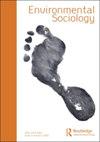A sociology of “climatage”: the appeal and counterproductivity of property destruction as a climate change strategy
IF 2.4
Q3 ENVIRONMENTAL STUDIES
引用次数: 1
Abstract
ABSTRACT Calls for the use of property destruction as a climate change strategy are understandable given social conditions that make such ‘climatage’ appealing, including the chronic failure of institutions to address climate change and the widespread sense that these institutions are illegitimate and will continue to fail to act (post-legitimacy); the inability of atomized individuals to successfully transform the forces driving climate change (real helplessness); the virtualization of politics into inconsequential moralism (hyper-politics); and widespread despair about the environmental crisis and future of the world. Despite the appeal, property destruction as a climate change strategy will likely prove counterproductive for at least three reasons, deduced from research on social movements: (1) property destruction will likely decrease public support for climate activists and climate policy, (2) property destruction will almost certainly increase state repression, a fight that climate activists will likely lose, and (3) alternative tactics that do not involve property destruction will likely prove more effective. In addition to our pragmatic intervention, we make a theoretical contribution to our understanding of social movements and strategy.“气候时代”的社会学:作为气候变化策略的财产破坏的吸引力和反生产力
摘要:鉴于使这种“气候变化”具有吸引力的社会条件,包括机构在应对气候变化方面的长期失败,以及人们普遍认为这些机构是非法的,并将继续不采取行动(后合法性),呼吁将财产破坏作为气候变化战略是可以理解的;原子化的个人无法成功转变驱动气候变化的力量(真正的无助);将政治虚拟化为无关紧要的道德主义(超政治);以及对环境危机和世界未来的普遍绝望。尽管有这种吸引力,但根据对社会运动的研究,破坏财产作为一种气候变化战略可能会适得其反,原因至少有三:(1)破坏财产可能会减少公众对气候活动家和气候政策的支持;(2)破坏财产几乎肯定会增加国家镇压,气候活动家可能会输掉这场斗争,(3)不涉及财产破坏的替代策略可能会被证明更有效。除了我们的务实干预外,我们还为理解社会运动和战略做出了理论贡献。
本文章由计算机程序翻译,如有差异,请以英文原文为准。
求助全文
约1分钟内获得全文
求助全文
来源期刊

Environmental Sociology
ENVIRONMENTAL STUDIES-
CiteScore
4.60
自引率
12.00%
发文量
34
期刊介绍:
Environmental Sociology is dedicated to applying and advancing the sociological imagination in relation to a wide variety of environmental challenges, controversies and issues, at every level from the global to local, from ‘world culture’ to diverse local perspectives. As an international, peer-reviewed scholarly journal, Environmental Sociology aims to stretch the conceptual and theoretical boundaries of both environmental and mainstream sociology, to highlight the relevance of sociological research for environmental policy and management, to disseminate the results of sociological research, and to engage in productive dialogue and debate with other disciplines in the social, natural and ecological sciences. Contributions may utilize a variety of theoretical orientations including, but not restricted to: critical theory, cultural sociology, ecofeminism, ecological modernization, environmental justice, organizational sociology, political ecology, political economy, post-colonial studies, risk theory, social psychology, science and technology studies, globalization, world-systems analysis, and so on. Cross- and transdisciplinary contributions are welcome where they demonstrate a novel attempt to understand social-ecological relationships in a manner that engages with the core concerns of sociology in social relationships, institutions, practices and processes. All methodological approaches in the environmental social sciences – qualitative, quantitative, integrative, spatial, policy analysis, etc. – are welcomed. Environmental Sociology welcomes high-quality submissions from scholars around the world.
 求助内容:
求助内容: 应助结果提醒方式:
应助结果提醒方式:


